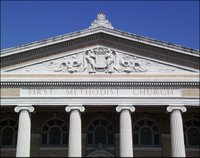Methodist Bishops Repent Iraq War 'Complicity'
 Fox News Ninety-five bishops from President Bush's church said Thursday they repent their "complicity" in the "unjust and immoral" invasion and occupation of Iraq. "In the face of the United States administration's rush toward military action based on misleading information, too many of us were silent," said a statement of conscience signed by more than half of the 164 retired and active United Methodist bishops worldwide.
Fox News Ninety-five bishops from President Bush's church said Thursday they repent their "complicity" in the "unjust and immoral" invasion and occupation of Iraq. "In the face of the United States administration's rush toward military action based on misleading information, too many of us were silent," said a statement of conscience signed by more than half of the 164 retired and active United Methodist bishops worldwide.President Bush is a member of the United Methodist Church, according to various published biographies. The White House did not return a request for comment on the bishops' statement.
Although United Methodist leadership has opposed the Iraq war in the past, this is the first time that individual bishops have confessed to a personal failure to publicly challenge the buildup to the war.
The signatures were also an instrument for retired bishops to make their views known, said bishop Joseph H. Yeakel, who served in the Baltimore-Washington area from 1984 to 1996. The current bishop for the Baltimore-Washington area, John R. Schol, also signed the statement.
The statement avoids making accusations, said retired Bishop Kenneth L. Carder, instructor at Duke University's divinity school and an author of the document.
"We would have made the statement regardless of who the president was. It was not meant to be either partisan or to single out any one person," Carder said. "It was the recognition that we are all part of the decision and we are all part of a democratic society. We all bear responsibility."
Stith, who spent more than three years after his retirement working in East Africa -- including with Rwandan refugees -- said going to war over the Sept. 11, 2001, attacks did not solve the real problems behind them.
The real issues are that much of the world lives in poverty, desperation and depression, he said, while an affluent minority of the world often oppresses them. Americans need to take responsibility for their world, Stith said.
"To ignore things and to assume that persons in the government have all knowledge is to reject our franchise and our democracy," Stith said.
About six weeks ago, Carder discussed the idea of a public statement with other colleagues who "had concerns" about the war, and the idea just grew, Carder said.
Last week, the statement circulated during a biannual meeting of the Council of Bishops, "and before the week was out, we had 95 bishops," Carder said.
In their statement, the bishops pledged to pray daily for the end of the war, for its American and Iraqi victims and for American leaders to find "truth, humility and policies of peace through justice."
"We confess our preoccupation with institutional enhancement and limited agendas while American men and women are sent to Iraq to kill and be killed, while thousands of Iraqi people needlessly suffer and die, while poverty increases and preventable diseases go untreated," the statement said.


0 Comments:
Post a Comment
<< Home